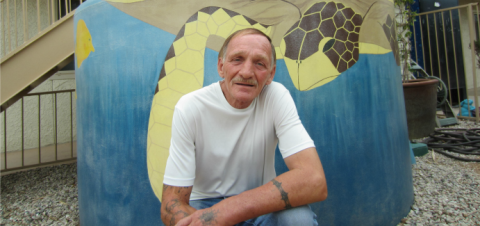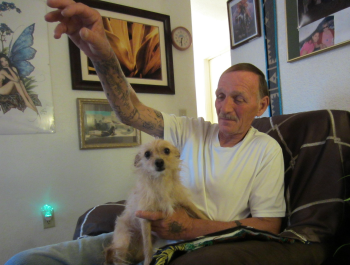Image

Peggy Hutchison, CEO, Primavera Foundation
Challenge: Every year, approximately 650,000 men and women are released from prisons across the nation. These former inmates face few affordable housing options, making it difficult for them to secure employment, get their lives back on track and become valuable members of the community.
Some 650,000 men and women are released from state and federal prisons every year across the country. They face many challenges upon their return, including finding a safe place to call home. The lack of affordable housing makes it difficult for them to secure employment, get their lives back on track and become valuable members of the community – causing many of them to re-offend and return to prison. These ex-offenders urgently need affordable, rental housing that welcomes those seeking a second chance, while adding value to the neighborhoods where they are located.
The Primavera Foundation’s mission is to provide pathways out of poverty through safe, affordable housing, workforce development and neighborhood revitalization. Located in Tucson, AZ, Primavera serves residents in one of the most economically-distressed large cities in the United States.
In Pima County, home of Tucson, one in five people lives below the poverty line and the homelessness rate is the highest in the state. In Arizona, around 13,000 people leave prison every year, and of those, about 2,000 people come home to Pima County.
Formerly incarcerated individuals in Arizona are unable to receive federal cash assistance such as Temporary Aid to Needy Families and are not eligible for Section 8 housing assistance. Those with felony drug convictions are not eligible for the Supplemental Nutrition Assistance Program (SNAP). In addition, most have multiple fines and fees they must pay upon release. Without safe, affordable housing, it is nearly impossible for them to secure employment and build foundations for stable futures. That is one of the main reasons why at least half of formerly incarcerated individuals re-offend and go back to prison, costing millions of taxpayer dollars.
Primavera’s strategy is to remove barriers for ex-prisoners seeking a second (or third) chance. Primavera offers high quality, affordable multi-family rental housing to former inmates and their families. Many of these properties participate in a crime prevention program to ensure that these homes and the neighborhoods are safe. Residents in rental housing programs are also offered employment services through Primavera Works, a temp-to-hire staffing social enterprise. The program focuses on employment retention strategies to support local residential customers, employers and the individuals they have hired.
 Primavera’s Rights Restoration collaborative offers free rights restoration clinics to people with felony convictions seeking to get their civil rights restored. Primavera also works closely with neighborhood groups, police departments and the Second Chance Tucson collaborative, which brings together public and private sector partners. Strategies include helping to educate and inform the general public about the challenges and opportunities for family members and friends returning home from prison.
Primavera’s Rights Restoration collaborative offers free rights restoration clinics to people with felony convictions seeking to get their civil rights restored. Primavera also works closely with neighborhood groups, police departments and the Second Chance Tucson collaborative, which brings together public and private sector partners. Strategies include helping to educate and inform the general public about the challenges and opportunities for family members and friends returning home from prison.Ricky Miller is one of our many success stories. He grew up in Pennsylvania with his mother, a garment worker, and his four siblings, in a home without heat, hot water or a bathtub or shower. Miller’s father, an alcoholic, left his mother while she was in the hospital delivering their sixth child. The children ended up in foster care. Miller spent his childhood on the streets, in reform school, in the state hospital -- and incarcerated. With barely a sixth grade education, mental illness, and an addiction to alcohol and drugs, it’s no surprise that Miller spent most of his adult life in and out of prison.
That is until he hit his mid-50’s, when he began to turn his life around. But though he had got a job, Ricky initially couldn’t find a landlord willing to rent to someone with multiple felony convictions and a poor credit history. But since 2013, Miller and his service dog Muppet have lived in one of Primavera’s multi-family rental housing units. “The staff is understanding. It's clean, peaceful, a good, safe environment. And it’s affordable,” said Miller, who was about to see his mother for the first time since he was 18 years old.
Providing safe, affordable rental housing to people returning from incarceration is a good community and business decision. People re-entering the community are motivated to pay their rent on time, to be good neighbors and are grateful for a second chance.
It is also the law. The U.S. Department of Housing and Urban Development (HUD) recently issued guidance regarding the denial of rental properties to people with criminal records. On April 4, 2016, HUD Secretary Julian Castro said: “When landlords summarily refuse to rent to anyone who has an arrest record, they may effectively and disproportionately bar the door to millions of folks of color for no good reason at all.”
Primavera learned many valuable lessons in this process, including: 1) safe, affordable housing is key to the successful return of formerly incarcerated individuals; 2) working with neighborhoods and the public in general is important for generating acceptance and support of these individuals; 3) working closely with employers who hire people with felony convictions improves employment retention; and, 4) partnering with other local organizations helps to create a broad-based web of support for these individuals and their families. These strategies transform lives and make our communities stronger, more inclusive, and more vibrant, which are benefits for all.

